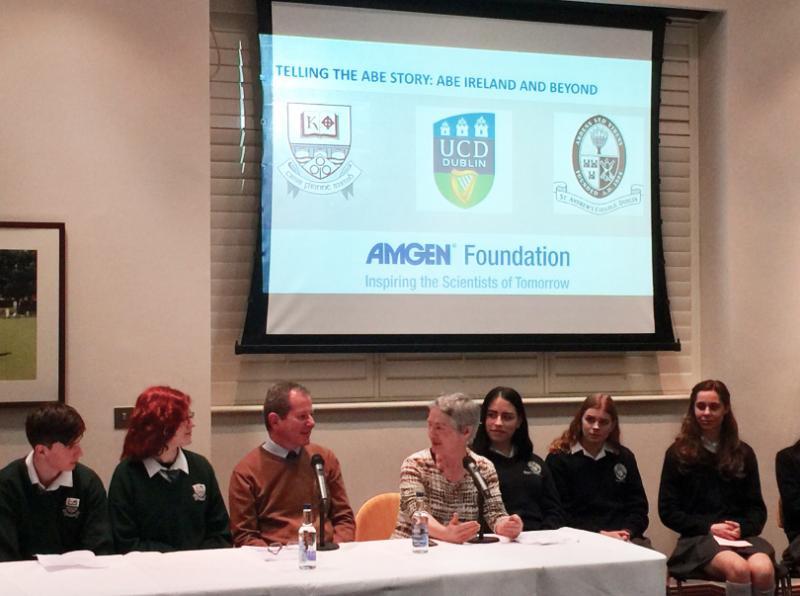Views of the Biotech Experience From Dublin
Hilary Rimbi, ABE TeacherTuesday, May 15, 2018

On one typically overcast morning in April, I stepped out of my comfort zone and headed down to the Herbert Park Hotel in Ballsbridge, Dublin, to address the delegates at the Amgen Biotech Experience (ABE) global annual meeting. I spent the evening beforehand thinking of what I would say during the allocated five minutes. There are so many positive things to say about the ABE program, and I wanted to do it justice; the idea of speaking in front of an assembled audience of experts, and strangers, however, was a bit daunting. I feel much more comfortable in my classroom, talking to the teenagers that I meet every day in school.
Yet, as a teacher in the ABE program, wanting to work to strengthen the biotech experience for students everywhere, I couldn’t refuse the invitation to speak at this important event. With some of my students in tow, I greeted the day as a new challenge.
I wasn’t alone: Mr. Gerry Dunne, a teacher from St. Kilian’s Community School in Bray, was also speaking and had brought some of his students. We were just two of the many teachers from the Irish ABE team who would have agreed to attend the meeting, as it is an initiative held in the highest esteem of teachers around Ireland.
At the annual meeting, we shared our experiences of using the ABE program in Irish schools, including how we manage to incorporate the activities into our lessons and the experience’s impact on our students. And it was interesting to hear about different approaches. For example, while I bring the ABE equipment to school to teach all our 5th year biology students – about 140 students per year for the last three years – over a two week period, I learned that Gerry uses the equipment with his own classes of 1st, 4th and 5th years and is planning to progress the students through the various labs as they progress through school. It was wonderful how we as teachers have been empowered to bring the technology to our own schools and tailor the delivery of lessons in a way that suits our own situation.
Most impressive, though, was hearing from the students themselves. They all spoke enthusiastically about ABE, and it was evident that they spoke from the heart. Each student reported one experience of ABE and its impact on them. One student, for example, shared her excitement at holding the delicate equipment and developing the skill of precision. She went on to explain her growing ambition to pursue studies in biotechnology.
A questions and answer session followed the teachers’ and students’ presentations. The students proved to be enthusiastic and insightful in their answers to questions from the floor, and their answers reinforced my idea of how inspiring the ABE is. The questions were unanticipated, and therefore the answers were unrehearsed.
I was surprised when one student explained that ABE taught them to be patient – I hadn’t thought about the impact beyond the biology curriculum. One of Gerry’s students explained how ABE gave her experiences that her immigrant mother would not have had in school, and this gave her a sense of empowerment.
Hearing about the unplanned outcomes that lessons can have on students, it was apparent that even if students do not proceed to study science beyond school, the ABE program will leave a lasting favorable impression on them. And for those students who will proceed to biology or health studies at university, it was obvious that ABE reinforced their liking for biological sciences. It is nice to think that as science teachers we are able to positively influence all types of students.
After our session, we listened in to an overview of ABE around the world. It was interesting to hear how ABE in different parts of the world is engaging with schools and communities outside schools. I was particularly impressed with the team from Australia that brought Amgen employees into a university lab to carry out the ABE labs – they seemed to be having just as much fun as I have seen my students having.
Biotechnology is a truly exciting and inspirational topic for all involved, and I am looking forward to bringing some of my insights from the meeting back to my classroom.
--
Rimbi leads the ABE program at St. Andrew’s College in Dublin.

